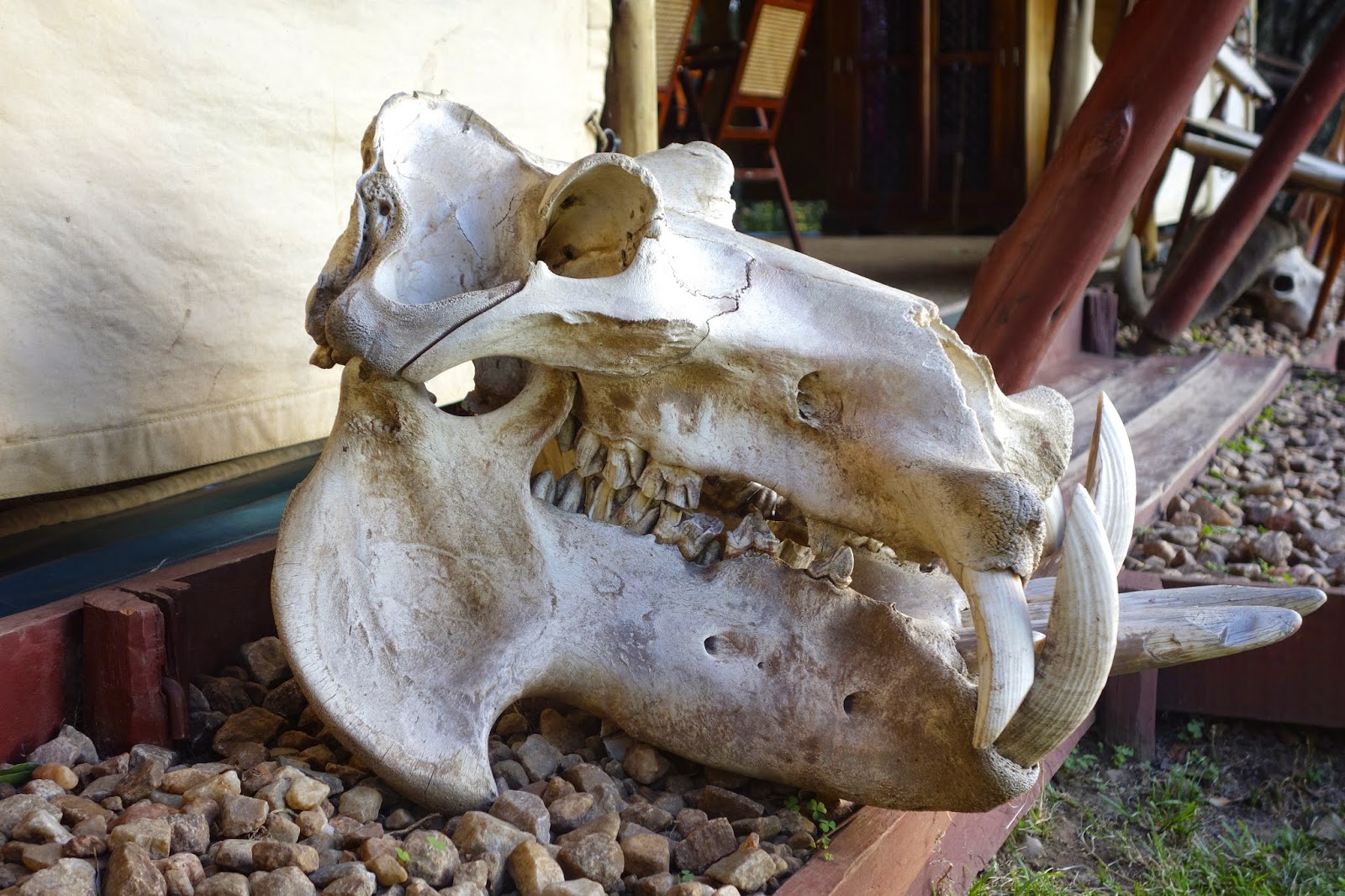Mara means "spot" in the Maasai language. Lone acacia trees and other forms of vegetation accent the grasslands. Last month, most of the two million wildebeest, zebra and gazelles migrated to Tanzania like they do every year. They're due back in July when pastures are greener.
Elephant Pepper Camp, named after a plant with medicinal properties, offered a more "authentic" safari experience because it wasn't fenced and the plumbing was rudimentary.
Every morning, a man handed you a gold pitcher filled with warm water to wash your face and hands and brush your teeth. If you wanted to take a shower after a game drive, someone had to climb on top of your tent and pour a bucket of water heated over a fire through a shower head. The camp staff was friendly and worked very hard to make us as comfortable as possible.
If we wanted to leave our tents from dusk to dawn, almost exactly 12 hours apart at the equator no matter what the season, we had to summon a Maasai with a spear. During our three-night visit, elephants and Cape buffalo grazed so closely that we could hear and see them from our beds in the moonlight. The larger animals were much better behaved than the monkeys who unzipped the flap of my tent and had a pistachio party one afternoon.
Wi fi connectivity, available only in the main tents, ended at 4 p.m.
This restriction left plenty of time for old media and inspection of the treasures that decorated the camp. Note Chris's choice of reading material. Very meta. We played Scrabble in the game room a couple of times, too.
None of this authenticity diminished Elephant Pepper's luxury, however. We dined communally on excellent food, made friends with Heidi and Dieter, a German couple, and drank gratefully at the only open bar we found in our visits to three camps.
OK, the cubs are kind of cute.
When I speculated to the camp manager that Maasai Mara attracted a bloodthirsty crowd, he told us a story about a pair of young English school girls. "We want blood, we want blood" they shouted from their departing safari vehicle on the first morning.
The smaller predators, like serval cats and jackals, dine mostly on leftovers.
Or babies. African lifespans can be mercilessly short. We watched a topi give birth. Less than 20 minutes later, the calf caught the eye of an immature cheetah which couldn't quite manage to kill it. Their dance of death lasted way too long, giving James more than enough time to drive us back for a front row seat when he got the radio call.
After that grisly experience, it came as a relief to spot this well-camouflaged leopard napping in a tree.
Sundowners offer camp visitors the perfect opportunity to brag about what they've seen. Elephant Pepper served freshly popped corn and trail mix along with cocktails. They know their market.
Many of the animals we saw were outside of the main park. The rangers who patrol it live in these prefabricated huts.
The hippos almost had the water to themselves.
But not quite. These crocodiles lay in wait for any stragglers. Earlier in the week, Heidi and Dieter watched one take down a zebra.
Elephants always were a welcome sight among our group.
They're so smart they use tools. Pushing over this tree and others like it allow the grass underneath to recover. Elephants are the only animals strong enough to push the tree away once enough grass for a snack has grown.
We learned this on our last day at Maasai Mara, when Chris and I joined a bush walk led by Patrick, the camp manager. Here he is explaining how to track animals.
Patrick, an emigre from Burundi, also warned us not to walk in front of any burrows like this one. Warthog tusks can do a lot of damage to your legs when the critters emerge in a startled rush.
Patrick's young protege identified these wildebeest remnants for us.
We also learned how to identify different varieties of scat, including these gazelle droppings.
The bush walk made a nice change of pace after more than a dozen game rides. We also worked up bigger appetites. Elephant Pepper set up and served the best bush breakfast by far in the loveliest location. Here's what "roughing it" looked like for us.
Our late afternoon flight from Maasai Mara took us over the Rift Valley to Nairobi, where more than three million striving Kenyans reside.






































No comments:
Post a Comment